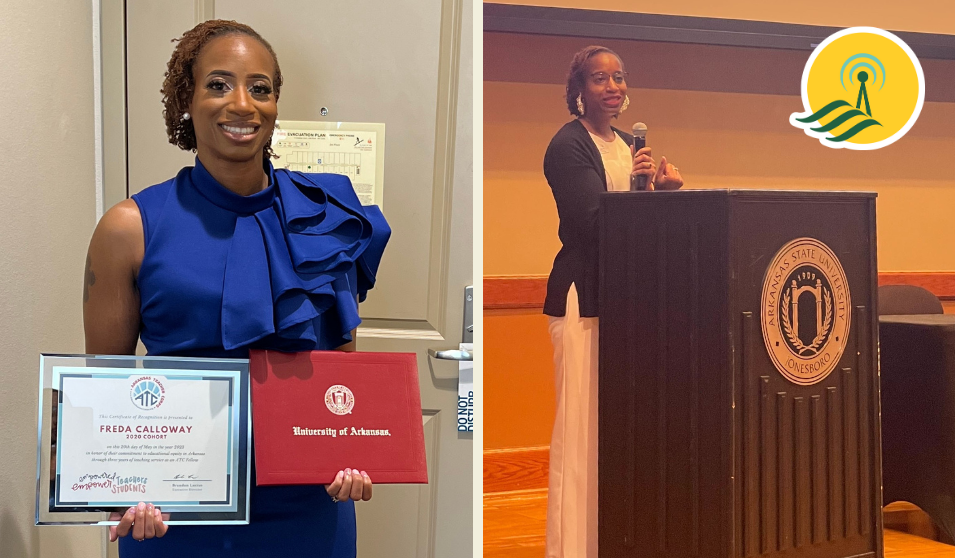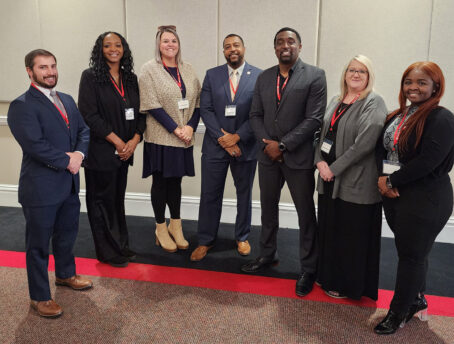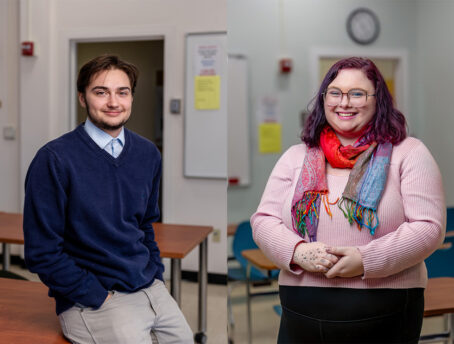Listen to the podcast here:
You can also find our podcast on Apple Podcasts, Google Podcasts and Spotify.
Hello, and welcome to the I Am A Rural Teacher Podcast, a project of Rural Schools Collaborative and the National Rural Education Association.
One angle for tackling the nationwide teacher shortage is the funding and implementation of teacher corps programs, which train educators in supportive cohorts to transition into teaching. Freda Calloway is one such graduate from the Arkansas Teacher Corps, which prioritizes placements in rural areas.
Freda now teaches English and Journalism in a rural high school in McGehee, Arkansas.
I would describe myself as being an introvert with extrovert tendencies. It's funny because my mom wanted me to be an educator. She just felt like that was my thing, because I was always trying to tell people what to do, for one. Not only would I try to tell somebody what to do, I'd actually explain to them how to do it. So she felt like I should be a teacher!
She explains how she eventually came to the teaching profession, after a college and work career focused on law enforcement:
I had this dream of going to school, becoming a business attorney, leaving Arkansas, and doing all these great things, but life just didn't work out that way. One of the places that I started working was a Head Start. I don't know, just something about it. I really liked dealing with the children. So I worked there for a little while, and then I thought, ‘Well, I'm gonna get back into investigations.’ I went back to DHS. When I got pregnant with my son, I was thinking, “Well, maybe I ought to give this education thing a try again.’ I lived in Little Rock, and I moved back to Monticello. Ended up working at a day habilitation. So I ended up working there as a data entry clerk. But I don't know, I was just drawn to going into the classroom and just interacting with the children. And that's how I ended up in teaching.
Freda grew up in Monticello, which isn’t a large city, at a population just over 9,000, but is still about twice the size of McGehee. Freda explains the advantages of teaching in a “really rural” place:
One of the advantages of being in a smaller classroom or in a small town is that everyone knows everyone. So even though I'm not from McGehee, all I have to do is talk to someone from McGehee. When I started working there, and even now, one of the other teachers that's been there for 30 plus years, she'll tell me who I'm about to get because she's just had them. And she's like, ‘Well, you know, this one, I taught his mom and his dad,’ and you know, she can just tell me information about them, give me information about their family background, and a lot of times the academic background of the student as well, which is very helpful. People are getting away from the village, but that's one thing that I like about McGehee, is like, the village is somewhat still there. And we need the village, our students need the village.
Freda’s journey to education was supported by the Arkansas Teacher Corps, housed in the University of Arkansas in Fayetteville. The Arkansas Teacher Corps, along with the Rural Community Alliance, lead Rural Schools Collaborative’s Arkansas & Delta Regional Hub. Freda explains how her experience in a Teacher Corps program was different from the typical pathway to certification:
It’s different from a regular, I'll say for instance, Master’s of Arts in Teaching program. It’s different from those programs because they offer you a lot of support. They give you tools to help you pass your PRAXIS exam. And they also have tutors and offer tutoring sessions. They cover the expenses for things like 240 Tutoring and study.com. And then, Summer Institute is like, very intense. It's a seven week journey, and you are assigned a mentor, and your mentor is based on your content area. You'll submit lesson plans, your mentor will go over the lesson plan, will let you know whether or not it aligns with tests, and not just let you know that but give you advice on how to make your lesson better. You go on to having a coach, and that coach stays with you through the entire three year program. They observe your classroom, make sure everything's in alignment, give you feedback that you could actually use. Ways to go back and be more engaging to your students. And I also worked as a summer mentor. It was really good. And it was also an opportunity for me to grow as an educator.
Freda also shared about her favorite moments in the classroom, including some lessons she particularly enjoys:
In my journalism class, I teach a news casting lesson. And at the end of the class, my students do a newscast project where they are given a topic and I email all the school staff to let them know, “Hey, my students are going to be coming around to interview you about, you know, this particular topic, can you make yourself available for them?” And so what they do is they'll go out and do their little newscast. They'll record everything, and they'll record their interviews. And then they use like Capcut to put everything together. And then we just watch how marvelous it is. And for English, my favorite lesson to teach is on themes and particularly with Macbeth. I love Macbeth, because I get my students to roleplay. I love it when my students just really get into it. It just makes me light up.
That passion for education, and helping students find joy in their classwork is also a driving factor in one of Freda’s favorite memories from her time as a teacher:
I had a student that was struggling in my journalism class, and it wasn't because he wasn't getting the material. He just wasn't doing his work. And so after talking to his mom about it, and finally encouraging him and getting him to do everything, he started doing his work. He started doing really well on his exams. And by the end of that semester, he had an A in my class and he went from having a D to an A. I like to contact the parents not just when bad things are going on, but I also like to give them good news. So I called his mom and I told her, you know, I was like, ‘Hey, your son has an A, he made an A on his final exam, and he has an A in my class now.’ And she literally started crying. And she started crying because she had been having such a bad day at work. And when she saw me calling, she thought that I was calling with more bad news. And so for me to call her and to give her that news just made her day. And I was glad that I was able to make her day after she had had such a bad day.
Freda also thinks it is important for students to have a teacher that looks like them and has a better understanding of some of their experiences:
When I made up my mind that I wanted to teach, I also wanted to be a mentor. Because I grew up in poverty, I went through a lot of things growing up. And I just felt that I could use my experiences to help other children and students like myself.
Freda strongly believes that connecting with students and families is the key to success in a rural classroom, and she left those interested in becoming a teacher with the following advice:
Go in with an open mind. It is important to build relationships with everyone. Number one, that you build relationships with the students, because if you don't, the students are not going to respect you. You have to let the students know that you care about them. And it trickles down. Once the students know that you care about them, they do better in class. You don't have as many class management issues. So relationship is important. And it's also important to build relationships with your co-workers. Because again, me not being from McGehee, I can, you know, talk to my co workers. And they give me information about things that are going on in town, things that may be going on with a family or a student. And it's also important to talk to the parents! It's important to build relationships with the parents, because there's times where I'll have a parent send me an email just to let me know, ‘Hey, such and such as having a bad morning. This happened over the weekend, or that happened over the weekend. I just wanted to let you know.’ So those things are important.
My name is Freda Calloway and I am a rural teacher.
Thank you for interacting with this episode of the I Am A Rural Teacher Podcast. We’d like to thank our partners at Rural Community Alliance and Arkansas Teacher Corps for jointly leading the Rural Schools Collaborative Arkansas & Delta Regional Hub, where Freda is based. Special thanks to Freda for sharing her story about becoming a second-career educator through the Arkansas Teacher Corps. I Am A Rural Teacher is a collaborative project between the Rural Schools Collaborative and the National Rural Education Association.




